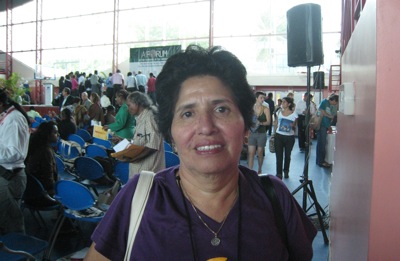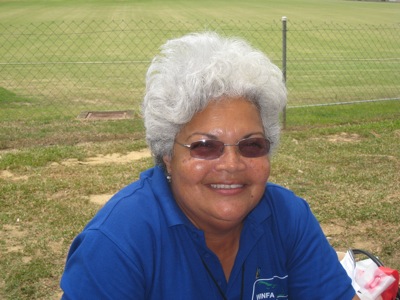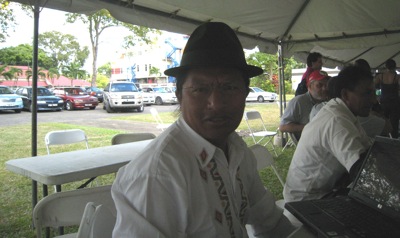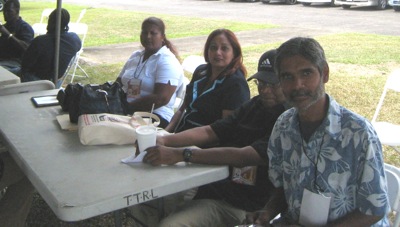The People at the People’s Summit
Many social movements from across the Americas were in Trinidad for the 4th People’s Summit to articulate their demands for moving the hemisphere towards economic (including trade) and climate justice, food sovereignty, human rights, and an end to militarization. They represented movements of women, peasants, indigenous peoples, labor and those struggling for environmental justice.
The World March of Women, represented by Rosa Guillen from Peru, is an international feminist action movement connecting grass-roots groups and organizations working to eliminate the causes at the root of poverty and violence against women. WMW struggles against all forms of inequality and discrimination directed at women.

Its values and actions are directed at making political, economic and social change. They center on the globalization of solidarity; equality between women and men, among women themselves and between peoples; the respect and recognition of diversity among women; the multiplicity of strategies; the appreciation of women’s leadership; and the strength of alliances among women and with other progressive social movements such as those of peasants (the Via Campesina) and indigenous peoples.
Grassroots International partner the Via Campesina was represented by the Windward Islands Farmers Association’s Marcella Harris from Dominica. WINFA brings together small farmers from across the Windward Islands, including Dominica, St. Vincent & the Grenadines, Grenada, St. Lucia and Martinique that are adversely affected by trade regimes like the World Trade Organization. Many of them are banana farmers that are struggling against large corporations like Chiquita, Dole and Del Monte. These top three corporations alone control close to 70% of the global market.

WINFA was formed in 1982 and has been a leading member of the Via from the Caribbean region. Marcella was, until recently, one of the members of the Via’s International Coordinating Committee. WINFA works on advocacy, education, trade justice (including fair trade), and is committed to learning exchanges between small producers and to gender and youth integration within its leadership and working.
Advocating for the indigenous concept of “buen vivir” literally, the good life, that is fast gaining acceptance among various movement sectors, Guillermo Churrichimba of the Coordinadora Andina de Organizaciones Indígenas announced to participants that indigenous people from across the hemisphere were gathering this May in Puno, Peru to, among other things, strategize jointly on climate justice.

Natural resource extraction has historically had an adverse impact on indigenous peoples worldwide, given that their territories and habitats encompass the vast majority of those resources. Climate change and the increasing rush to extract remaining resources is further endangering not just the lifestyles and cultures but the very existence of indigenous peoples, who have led the struggle for recognizing what they call plurinacionalidad or plurinationality.
Local movements and organizations from Trinidad & Tobago were intimately involved in the organization of the People’s Summit. Trade unions like the powerful Oilfield Workers Trade Union were represented by their leaders such as David Abdullah who is also a leading organizer within the Assembly of Caribbean Peoples.
Another local group that was involved was the “Citizens of Claxton Bay,” which is a local environmental justice organization. Wayne Kublalsingh, one of its organizers, shared with us that the group comprises local residents, fishers, and farmers who are mobilizing to halt the construction of a mega steel mill and industrial estate that would destroy the fragile coastal mangrove ecosystem, pollute the environment including water sources, and pose a hazard to the livelihoods of local fishers and farmers.

